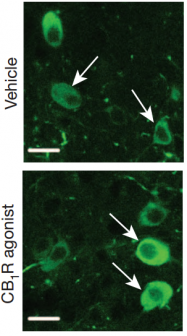A new insight into why cannabis gives you the munchies!
Cannabis is always a talking point, even in the world of science, which might actually say something about our culture that we are so fascinated with drugs… but that’s a topic for another post. Today, I want to talk about the latest paper which is hitting the headlines, it has just been published in the journal Nature in which a group of scientists claim to have found how cannabis gives you the munchies.
Now some of you, the regulars of HeadStuff, may remember a piece (my second piece actually) which was an interview with the scientist Dr. Edgar Soria-Gomez on his great paper in Nature Neuroscience which showed how cannabis can give you the munchies. So you might ask yourself, what’s new this time?

Well in fact these researchers have very nicely identified a novel role for a particular population of neurons in the hypothalamus called POMC neurons. Previously, it was thought that these neurons were responsible for the cessation of eating and for feeling full, but in this paper researchers have shown that not only are these neurons responsible for telling you when you feel full but they can also tell you when you need to eat! That sounds crazy, but we shouldn’t think of neurons as a simple switch, turning on and off certain functions. Neurons are rather more like very complex dimmer switches, which can have multiple roles and functions depending on exactly how they get activated.
Therefore, as science and technologies advance we are constantly updating the textbook, finding out more and more complex functions of neuronal populations which we actually thought we understood quite well.
So even though last year, I presented Edgar’s paper as ‘the definitive mechanism behind why cannabis gives you the munchies’, this is likely to be a highly complex mechanism, with multiple non-exclusive pathways including those described by Edgar and his colleagues as well as the mechanism described in this paper by Koch et al. I asked Edgar, an expert in the field, for a comment on this recent paper and he said;
First of all, let’s take out of our minds that this work was published on Nature. Let’s focus on the data. Very briefly, Koch et al showed that cannabinoid receptor 1 (CB1) activation could preferentially control (in one single cell population) the release of one peptide over the other, potentially due to the activation of intracellular (possibly mitochondrial) pools of CB1 receptors. The researchers studied a very “well-known” (maybe still a bit unknown) hypothalamic circuit in charge of feeding regulation, comprising the arcuate nucleus and the paraventricular nucleus of the hypothalamus. In particular, the focus in one cell population classically known by its anorectic properties, the pro-opiomelancortin (POMC) neurons. Imagine the POMC as a big protein from which you can obtain several peptides, for example, beta-endorphin and alpha-MSH. Thus, the investigators found that CB1 activation (not by THC, aka. marijuana’s psychoactive component) could stimulate food intake (in satiated, not hungry, state) by increasing the levels of beta-endorphin and not alpha-MSH, revealing another face of POMC cells, and this is what we should keep in our minds.
As the authors say in the paper, cannabinoid regulation of food intake is quite complex because depends on: brain circuit, brain area, cell type, and different pools (intracellular vs plasma membrane) of CB1 receptors.
Just to highlight the importance of the endocannabinoid system in the brain, the type one cannabinoid receptor (CB1) is believed to be the most highly expressed metabotropic receptor in the whole brain. Which suggests that this receptor is very important for normal brain function and not just involved in getting high and the munchies!
For those who really don’t care why cannabis gives you the munchies and are fed up of hearing story after story about weed, well these findings are quite important and hold great value for potential treatments involving eating disorders. In fact, there have already been attempts to bring to the market a diet pill which takes advantage of the endocannabinoid system. We hit upon this point in my interview with Edgar; In the most infamous case, Rimonabant seemed to work very well in helping obese people lose weight by blocking CB1R activity, this drug was doing very well in clinical trials and was even approved in Europe until it was observed that some of the side effects including severe depression and suicidal thoughts.
Together, these findings are opening our eyes to the complexity of the endocannabinoid system in the brain. I wouldn’t be surprised if we see another high profile paper demonstrating another mechanism by which cannabis gives you the munchies. However, one very important question that remains to be answered is that of the next step in the process of the munchies, how does cannabinoid signalling in the brain actually lead to the biological process of eating? What these papers have shown is comparable to understanding how to put the key in the ignition and starting your car, but still not understanding how exactly turning the key makes the car run. Future papers will hopefully reveal more about this complex process and could potentially lead to greater and more effective treatments for eating disorders.
